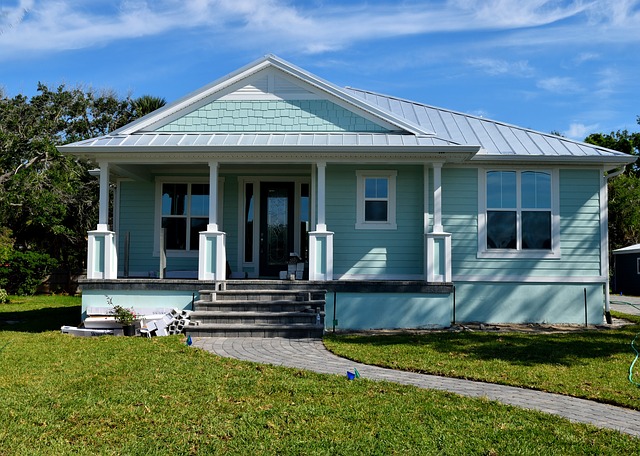 What can be done with a house that is just perfect but it is in a bad neighborhood or a dangerous spot? Think about homes that are in decent condition; yet, too close to the water. America is experiencing flooding now that is not supposed to happen in 500 years.
What can be done with a house that is just perfect but it is in a bad neighborhood or a dangerous spot? Think about homes that are in decent condition; yet, too close to the water. America is experiencing flooding now that is not supposed to happen in 500 years.
That cute little beach bungalow could easily get wiped out in the next hurricane. It might be time to think about moving those homes to a safer area or higher ground.
The International Association of Structural Movers says that around 8,000 homes are moved each year in America. Relocation may be due to hazards, such as the erosion of an oceanfront or cliffside lot. Others relocate for their historical value.
What It Takes To Move A Home
There are five main considerations for moving a home, which are:
- Legal Issues: Moving the home and transporting it must be allowed by law.
- Strength: A home must be strong enough to stay together when disconnected from its foundation.
- Lift and Transport: It must be possible to lift the home and transport it to the new location.
- Access: Access to the home’s new location must be unimpaired on the route to get there and on the site when the home arrives.
- Cost: The cost to move a home may be shockingly prohibitive.
Legal Issues
The legal issues can be very challenging. Do not give up easily, if the idea of moving a home is blocked at first because it may be possible to get a one-time waiver from the regulations.
Strength
Some homes are not strong enough to move. However, it is surprising what is possible if the home and/or lot is very valuable.
There are home-moving projects that lifted Victorian-style homes built over one hundred years ago in the most valuable parts of San Francisco. These homes only moved upwards. They stayed on their lots. The moving project raised them 15-feet higher to allow a garage to be built underneath. These well-built wooden homes survived the 1906 earthquake. They were carefully raised without damaging them.
Lift And Transport
Experts use many techniques to lift a home and prepare it for transport. Homes may be transported by strong flat-bed trucks, by industrial, heavy-lifting helicopters, and on barges in the river or ocean. Homes can be disassembled partially to make moving them easier.
Access
When moving a home, even if separated in pieces, the pieces may be very large. The entire transport route needs to be carefully checked by an engineer for proper clearance heights, enough turning radius when needed, and sufficient width for passage.
Cost
While many homes are movable, the cost may be too high to make it worthwhile. However, the cost to move a multi-million dollar mansion falling off a cliff may be far less than the home’s value, which might otherwise be lost.
Summary
If there is a beautiful heritage home sitting on a cliff’s edge overlooking the ocean and teetering on the edge of collapse, there is a new way to think about it. It may make perfect sense to move it to a lot that is down the street and further away from the edge.
Your trusted real estate agent is ready to help youfind the perfect home. Give them a call today!
 It’s often harder to make friends as an adult than it is when you’re a child. It’s even more challenging to make adult friends when you move into a new neighborhood. You may feel like people already have their own group of friends and aren’t looking to include newcomers. Of course, that’s just an illusion.
It’s often harder to make friends as an adult than it is when you’re a child. It’s even more challenging to make adult friends when you move into a new neighborhood. You may feel like people already have their own group of friends and aren’t looking to include newcomers. Of course, that’s just an illusion. Many baby boomers are reaching retirement age. If they set up their financial planning well, while younger, they should have accumulated enough wealth to have some discretionary money available for making investments.
Many baby boomers are reaching retirement age. If they set up their financial planning well, while younger, they should have accumulated enough wealth to have some discretionary money available for making investments. A hot market in real estate is identified by a few things, which include higher prices, lower amounts of unsold inventory, and desirable neighborhoods. Neighborhoods can increase in value because of having an excellent location, high-paying jobs, quality schools, and a variety of attractive amenities.
A hot market in real estate is identified by a few things, which include higher prices, lower amounts of unsold inventory, and desirable neighborhoods. Neighborhoods can increase in value because of having an excellent location, high-paying jobs, quality schools, and a variety of attractive amenities. There is a joke about gated communities that says the walls are not just there to keep the people out but to keep the residents in. Living in a gated community that is subject to the rules of a homeowners’ association (HOA) can be a pleasant or a severely irritating experience, depending on the perspective a homeowner has about lifestyles.
There is a joke about gated communities that says the walls are not just there to keep the people out but to keep the residents in. Living in a gated community that is subject to the rules of a homeowners’ association (HOA) can be a pleasant or a severely irritating experience, depending on the perspective a homeowner has about lifestyles. A short sale is when the mortgage lender(s) agrees to sell the property for a lower amount than the loan-balance remaining.
A short sale is when the mortgage lender(s) agrees to sell the property for a lower amount than the loan-balance remaining. Foreclosure is a process that happens over many months. There are various opportunities to acquire real estate that is in a different stage of foreclosure, including before the foreclosure process completes. This short guide identifies the different stages and the opportunities that may exist to acquire a property at a discounted price.
Foreclosure is a process that happens over many months. There are various opportunities to acquire real estate that is in a different stage of foreclosure, including before the foreclosure process completes. This short guide identifies the different stages and the opportunities that may exist to acquire a property at a discounted price. An estate sale is the sale of the property owned by a person after a person dies. This sale may include real property, such as a home, and personal property, such as the home’s contents.
An estate sale is the sale of the property owned by a person after a person dies. This sale may include real property, such as a home, and personal property, such as the home’s contents. When investing in real estate, few people think about water as a high priority. All of us have become used to water being readily available and rarely give it a second thought. Most would think that water is only a consideration for farmers who need it to irrigate agriculture. However, due to climate change and population growth, the world is experiencing large impacted areas and major cities that are running out of water.
When investing in real estate, few people think about water as a high priority. All of us have become used to water being readily available and rarely give it a second thought. Most would think that water is only a consideration for farmers who need it to irrigate agriculture. However, due to climate change and population growth, the world is experiencing large impacted areas and major cities that are running out of water.